Blockchain Technology to Streamline the Vehicle Registration Process
As we all know, Blockchain has literally enabled the technology ecosystem to take a significant leap of innovation. Along the years, as Bitcoin has managed to take prominence and grabbed attention from all over the world (and rightly so), people took to studying all about cryptocurrency and Blockchain- the very platform that enabled crypto transactions to take place.
By identifying the need to make transactions more secure and recording them seamlessly, Satoshi Nakamoto came up with Bitcoin- the digital, cryptocurrency and Blockchain, the technology Bitcoin works on.
To put it simply, Blockchain is a shared, distributed ledger for recording transactions and tracking both tangible and intangible assets across a trusted network. This digital ledger records transactions publically as well as validates all transaction data seamlessly. Blockchain, with its potential uses and benefits, has already intrigued many. To mention the top benefits that have actually created ripples in the cryptography domain- it is Blockchain’s ability to-
- Migrate from trust-based system to a non-trust based system
- Move from a centralized model to a decentralized model
- Keep transactions and records secure and immutable
- Provide enhanced transparency as transactions are visible to all
…and lots more.
But, Who is Using It?
Many still believe that Blockchain is only capable of handling and managing crypto transactions. Some also believe that it is only useful to the BFSI industry. However, that is not the case with Blockchain. Businesses across various industries are trying to experiment and leverage the potential of Blockchain on different applications. To understand how Blockchain can be used in something other than a monetary transaction, here’s an interesting use case.
Blockchain for Vehicle Registration
The process of vehicle registration has always been cumbersome. It is a time taking process where multiple parties are involved and also poses a risk of information manipulation, data duplication and various errors.
In such a scenario, critical information can get highly vulnerable to frauds and data tampering or even become non-traceable.
By bringing Blockchain into the picture and moving the entire vehicle registration process on to Blockchain, a lot of these issues can easily be taken care of. Blockchain comes to the rescue by reducing the average turnaround time. Blockchain will enable parties to push data as a smart contract that eventually becomes a single source of immutable data to all parties. Not only this, Blockchain in vehicle registration ecosystem, will help reduce the risk of frauds and attacks, as data updates are only possible by authorized personnel using a private key. In fact, any tampering of data can also be easily tracked on Blockchain. The best part is, Blockchain will provide a single and easy view of the vehicle lifecycle which is not available today.
To further explain this, let’s first understand the roles of various stakeholders involved in the vehicle registration process. We would also look at some basic workflows and understand how they are being simplified using Blockchain.
Vehicle Registration Lifecycle
- Manufacturer: Pushes the vehicle to BlockChain, by adding basic details like make, model, variant, chassis number, engine number etc and executes the sale of the vehicle.
- Dealer: Executes the sale of the vehicle to the end customer.
- Insurance Agency: Validates the customer and vehicle data and provides insurance.
- Registration Authority: RTO will be responsible for approving registrations and providing the registration number, performing vehicle transfers and vehicle resale.
- Police: Provides clearance for sale and transfer of vehicle as well as issues challans for traffic violations.
- Service Center: Adds service details like job cards and part replacements.
- Customer/ Car owners: Approve sensitive information exchange like PII
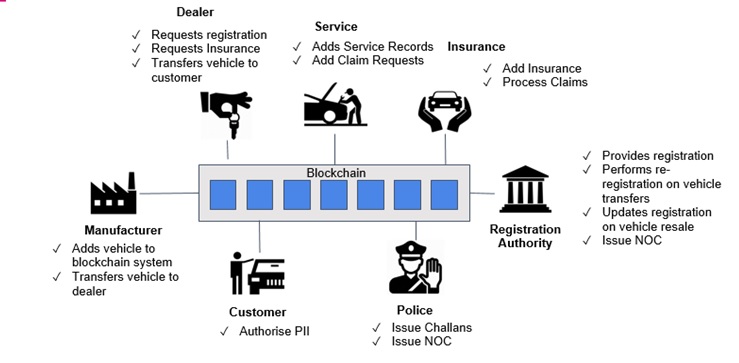
Manufacturer-Dealer Workflow:
- The manufacturer adds new vehicles to the blockchain network as a smart contract by adding basic details like make, model, variant, chassis number, engine number etc.
- Executes the sale of the vehicle to the dealer on the smart contract, a smart contract can then automatically transfer ownership to the dealer.
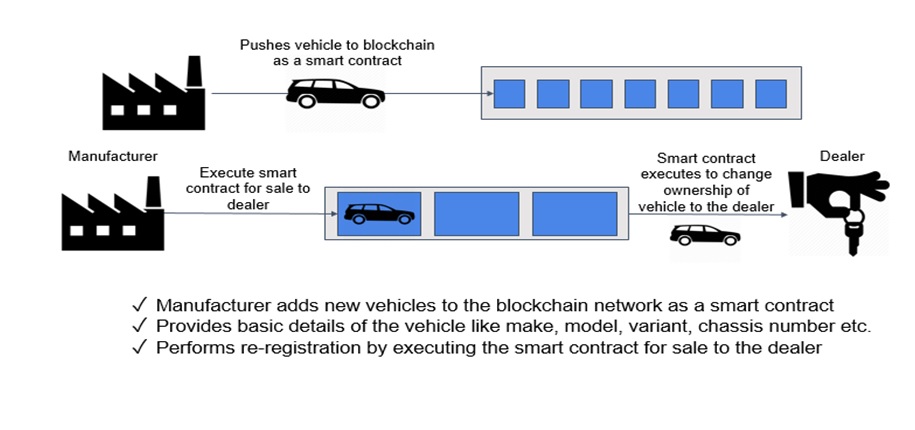
Vehicle Sale/ Registration Workflow:
- The Dealer can initiate vehicle sale contract.
- A smart contract can then automatically send out requests for registration and insurance.
- The RTO and insurance agency can validate required data about vehicle and customer from Blockchain and provide registration and insurance respectively.
- On successful processing of the above step, the vehicle ownership can be automatically transferred to the customer by the smart contract.
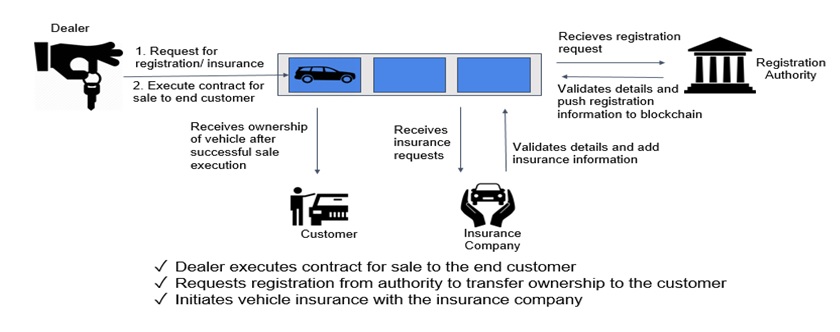
Vehicle Transfer Workflow:
- The vehicle owner can request for NOC via smart contract.
- Smart contract sends a request to concerned authorities to NOC and clearance
- After successful validation of information from Blockchain, the concerned authorities can provide clearance and NOC, which can be used to obtain a new registration.
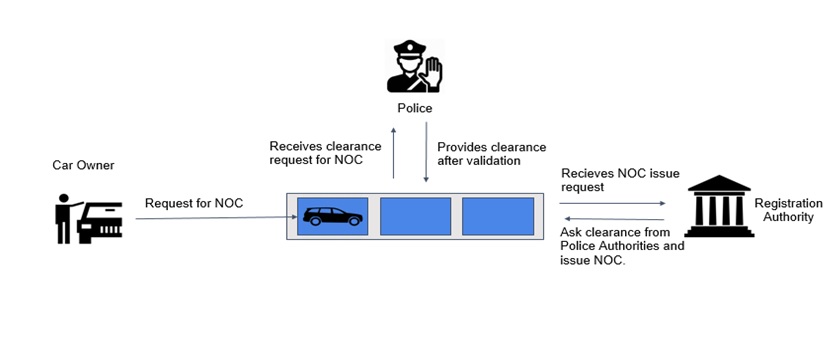
Vehicle Resale Workflow
- Vehicle Owner executes the smart contract for resale of a vehicle.
- Smart contract sends a request to concerned authorities to NOC and clearances.
- After successful clearance, a smart contract can execute itself to transfer ownership to a new owner.
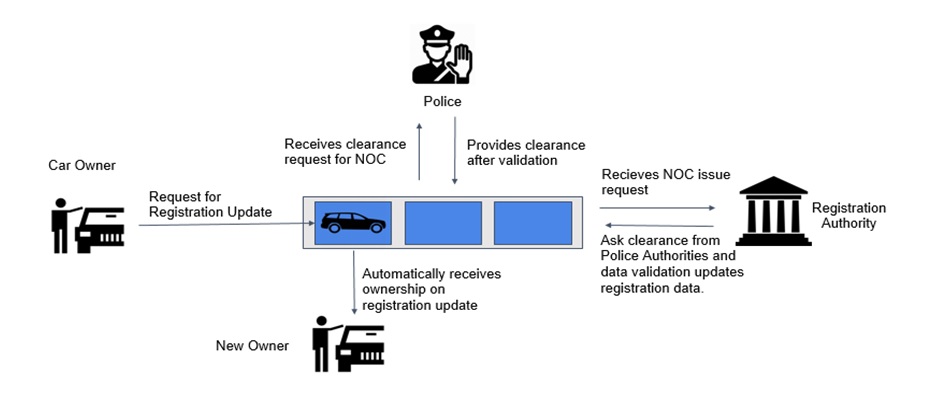
Conclusion
Vehicles are a widely used asset across the world with a high associated value. Adopting technology such as Blockchain to increase transparency of vehicle ownership will make the entire process more trustworthy. Further, this will alleviate manufacturers, customers, authorities and all other involved parties of time-consuming, manual, and repetitive tasks.


Yes, it is nice article.But it is not mention, which framework will be best for implementing it (means hyperledger fabric, iroha or else)
Secondly I am college student and I do want to develop an block chain based cloud storage (such as store). But if possible dear ma’am /sir please me some guidelines which framework to use and what methodologies should I used..
I m cyber security +block chain +devsecops enthusiast
Thank u